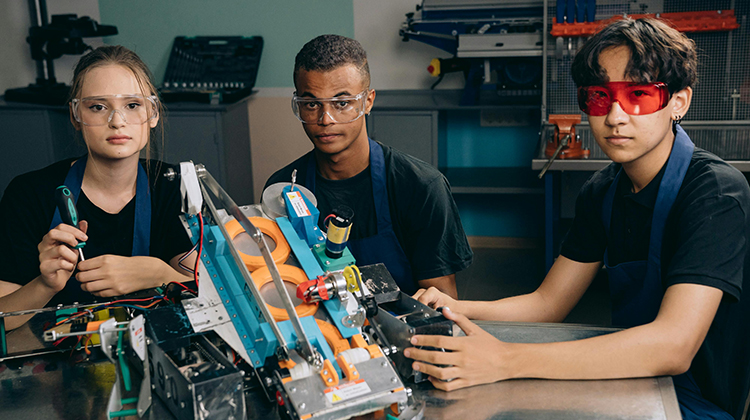Are Gen Z ‘Delulu’, ‘Demure’, or Rather Advocating for Necessary Change?

Gen Z, or individuals born between 1997 and 2012, are increasingly entering the workforce. By 2025, this generation is predicted to account for 27% of the global workforce and is set to become the largest generation in the workforce by 2035. So, with almost 2 billion members Gen Zers entering the workforce, companies must understand the priorities and values that matter to Gen Z in the workplace.
So, how ‘demure’ is Gen Z in the workplace? A new research report, titled Gen Z in the Workplace: Welcoming the Next Generation, by Udemy, a global online skills marketplace and learning platform, deconstructs several Gen Z stereotypes and explores critical themes for employers to consider when engaging with this generation.
Shattering The Stereotype
If you’re among the 8.5 million Australians active on TikTok each month, you’ve probably seen the words “demure” and “mindful” popping up more often in your feed. This isn’t the first of the social media trends relating to behaviour shifts at work either. Since COVID-19, when people gradually return to the office, the generational divide in work approaches has become more pronounced. With Gen-Z now being part of that workforce, they’ve demonstrated a strong commitment to work-life balance and are unafraid to voice concerns about culture in the workplace.
This has culminated in several workplace trends, including quiet quitting, acting your wage and bare minimum Mondays.
So, with the creation of the $4 carbonara in a tin for Gen Z who value convenience, we can note a broader truth that workplaces must recognise: businesses need to actively understand and - in turn - cater to the wants and needs of their young co-workers.
In their professional lives, Gen Z tends to seek streamlined workflows and an “open-door policy” that enables achieving business outcomes along with personal development goals. By recognizing their preferences, employers can cultivate an office environment that empowers young professionals to thrive, thereby boosting productivity and job satisfaction. Adapting to these needs is crucial for attracting and retaining Gen Z talent in today’s competitive job market.
Contrary to the stereotypes of being "lazy" or "uninterested in returning to the office," data from Udemy demonstrates that Gen Z is, in fact, the most motivated generation when it comes to their professional development, with 65% prioritising it more than their Millennial and Gen X peers.
Gen Z’s approach to work often contrasts with traditional work norms including long hours, early morning meetings, and more. So while some may interpret Gen Z's differing preferences as a challenge to established practices, it's important to recognize that these differences reflect evolving attitudes toward work and the importance of building a culture of continuous learning and growth.
Additionally, research shows that an impressive 94% of Gen Z surveyed dedicate at least one hour each week to learning, with their career progression tied closely to the development of soft skills. While Gen Z values technical skills such as programming (36%) and artificial intelligence (30%) to enhance their job readiness, they also prioritise skills like communication (30%) and critical thinking/problem-solving (26%). Notably, 84% of Gen Z respondents consider soft skills vital for professional success.
Professionals from all generations can learn from Gen Z’s emphasis on effectively utilising soft skills in the workplace, which not only facilitates individual growth but also drives overall business success.
New Elements of the Workplace are being Unlocked
As the so-called “TikTok generation”, Gen Z workers are also actively seeking to prioritise their personal well-being over demanding workloads, having observed the possible effects of toxic workplaces and burnout on previous generations. Therefore, more and more professionals are asking for employee well-being to be prioritised in the workplace. One of the most significant priorities for Gen Z is work-life balance, having the time to maintain a life outside of work. They are looking for workplaces that improve their lives rather than dominate them, prioritising overall well-being and a better work-life balance.
Creating a Work-life-learning Balance
The learning and skills landscape in the workplace is dynamic for each business and constantly evolving, with tech skills becoming outdated in as little as 2.5 years. According to a 2021 Gallup survey conducted on behalf of Amazon, 66% of workers ages 18-24 ranked learning new skills as the third-most important perk when evaluating new job opportunities.
Embedding upskilling and reskilling into company culture can help with recruiting, engaging and retaining top talent in the industry. Companies around the world are increasingly focused on offering their employees personalised learning programs that can help give them a competitive edge.
In today’s evolving workplace, providing access to flexible learning resources is essential. The COVID-19 pandemic accelerated our adaptation to remote work and learning, with Gen Z at the forefront of this cultural shift. This generation's adaptability has driven a new set of workplace expectations and a need to transform standards in their professional lives.
Far from the negative stereotypes, Gen Z is highly motivated and driven in their pursuit of transforming the workplace environment. If organisations want to tap into the full potential of this new generation of the workforce, they must understand the values, career expectations, and personal development goals that matter to them.
Image by mikhail nilov